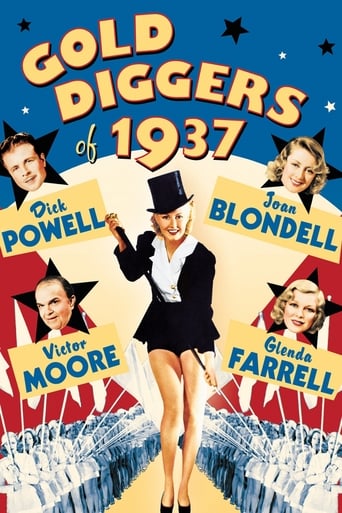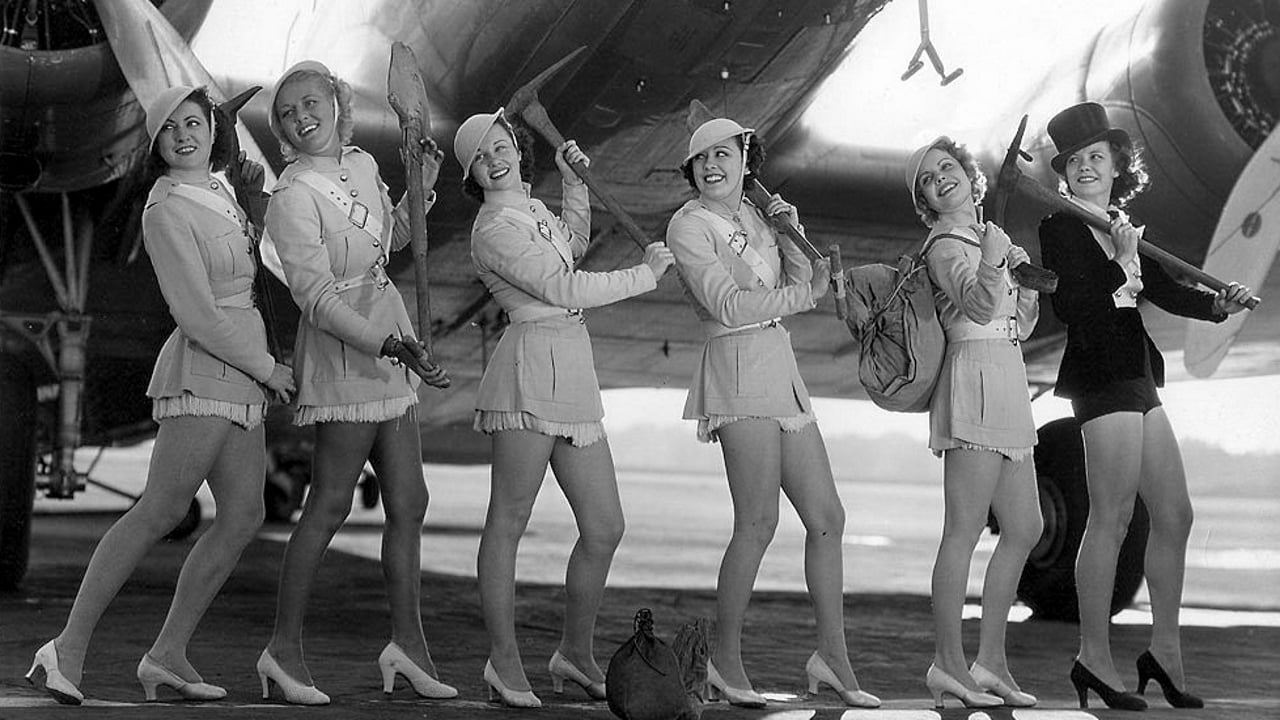mark.waltz
That beloved scene stealer Victor Moore steals the show here as a businessman who finds a second childhood as a hypochondriac businessman who gets an instance policy from Dick Powell, finds the fountain of youth and puts on a show. Powell finds love with chorus girl Joan Blondell while Moore doesn't find less with Blondell's pal, Glenda Farrell, who falls for him in spite of the age difference, just as Alone MacMahon did for Guy Kibbee in 1933's entry.Not as good as previous Busby Berkeley Warner Brothers musicals, it has a bit of a zing, but gives an indication to budget cuts that Warner Brothers was making in their musical department that would be obvious by the end of the decade. There's still plenty of good songs and a few great dance numbers, and the newly married couple of Powell and Blondell have more spark than Dick did with Ruby.While "With Plenty of Money and You" is the best known song, there's also the snappy "Speaking of the Weather" which has a great staging in a number that doesn't take place on stage. Then, there's the finale, "All's Fair on Love and War" which is no "Lullaby of Broadway" but thrilling none the less.
Ron Oliver
Warner Bros. trots out its Gold Diggers concept again in this amusing little musical which serves largely as a wistful reminder of the fun & vivacity of the original pre-Code feature. Perhaps Dick Powell's smarmy little mustache, seen immediately after the opening credits, should have been enough to signal that things were different now.The plot of every Gold Digger film is centered around its music. The songs here are pleasant, but unmemorable and the Busby Berkeley spectacle--'All's Fair In Love And War'--reveals the Master at his repose, his choreographed rocking chairs and banners not quite registering the requisite pizzazz one remembers from his earlier classics.Powell tries his hardest to ingratiate, but his preppy days appear to be passing and casting him as an insurance salesman is a bit of a ho-hum. Lots of fun, however, can be found with Warner's two sensational brassy blondes, Joan Blondell & Glenda Farrell, in their final film together. Still wisecracking & sassy, they grab the movie's best dialogue and run off with it, giving some laughter to their comedy duo swan song. Comic Victor Moore shines as a cranky impresario with a bad case of hypochondria.Sharp-eyed movie mavens will spot Fred Snowflake' Toones as a shoe shine attendant; Jane Wyman as an excited chorus girl at the station; and Frank Faylen as a man shaving on the train, all unbilled.
lugonian
GOLD DIGGERS OF 1937 (Warner Brothers, 1936), directed by Lloyd Bacon, is the third musical in the yearly-titled series with the choreography by Busby Berkeley. Released in theaters as a Christmas attraction of 1936, I find it to be a notch below the 1935 edition and no where near as good as the one of 1933, but still acceptable entertainment, highlighted with a show-stopping musical finale.The story begins at a convention in Atlantic City where Andy Callahan (William B. Davidson) of Good Life Insurance Company tries to encourage his salesmen to go out and sell. Rosmer "Ross" Peek (Dick Powell) and "Boop" Oglethorpe (Lee Dixon, in his feature film debut) are his two top insurance salesmen who lead the men into singing their way to the train station for their destination being New York City. While on the train, Boop becomes acquainted with a Southern gal named Sally (Rosalind Marquis); Ross meets up with Norma Perry (Joan Blondell), a stranded showgirl accompanied by Genevieve Larkin (Glenda Farrell), who in turn meets Monty Wethered (Osgood Perkins, father of Anthony Perkins), a crooked backer of JJ Hobart Productions. Rosmer helps Norma by offering her a position as his secretary at the insurance firm. As for Genevieve, she joins forces with Monty's assistant, Mr. Hugo (Charles D. Brown), another chiseler who has pocketed and lost most of Hobart's investments. They want to get the 59-year-old theatrical bachelor producer, JJ Hobart (Victor Moore) to take on an insurance policy by having Genevieve arrange to have Norma get Ross to meet up with him. After Hobart passes the million dollar insurance policy physical with Ross hired as his agent, Monty and Hugo try their best to see that Hobart meets with an "accident." But when all else fails, Hobart eventually does land in the hospital after Genevieve has a change of heart and tells him the truth. It is then up to the younger crowd, who feel that Hobart might die, to do away with the crooks Monty and Hugo and help put Hobart's upcoming show together.Songs featured include: "The Life Insurance Song," "Speaking of the Weather" and "Let's Put Our Heads Together" By E.Y. Harburg and Harold Arlen; "With Plenty of Money and You" and "All's Fair in Love and War" by Harry Warren and Al Dubin. Dick Powell, with his pencil-thin mustache, sings "With Plenty of Money and You" before the opening titled cast and credits. He reprises the hit money song to Blondell later on in the story as he accompanies her home from their dinner date. "Speaking of the Weather" also gets to be heard twice, first in the insurance office sung by Powell to Blondell, later sung by guests at the pool and garden party with Lee Dixon doing his "puppet on a string" tap-dancing solo. Also sung during the party sequence is "Let's Put Our Heads Together" (a pretty tune introduced by Powell). Of the songs presented, "All's Fair in Love and War" is the only number not part of the storyline. It's a ten minute staged production, part of the JJ Hobart Revue, compliments of Busby Berkeley and his display of chorus girls marching in military fashion and flag waving. This well choreographed finale was nominated for Best Dance Direction, and one of the few highlights of the film.Victor Moore, a pudgy bald character actor of numerous comedies, comes off best here. Besides being an amusing comedian whose catch phrase if, "Life begins at 59," the scene that stands out most is the moment he gets sentimental in telling gold-digger Genevieve (Farrell) of he being a lonely old man of the theater whose life has now been fulfilled by her presence in making him feel young again, and now wanting to marry her. Even Farrell manages to present herself as a gold-digger with a heart of gold, and she carries this particular scene well without making it appear silly. As for Powell, his character at times appears to be more foolish than funny, but makes up for it during the romantic and singing spots.THE GOLD DIGGERS OF 1937 became available on DVD in 2008, and can bee seen broadcast on Turner Classic Movies. Look fast for a young Jane Wyman in the early portion of the movie with one line, "Happy days are here again" as she and other show girls watch a parade of insurance men entering the train, and Susan Fleming (Mrs. Harpo Marx) in a small role as a secretary billed as Lucille. (***)
Alice Liddel
Busby Berkeley's films are the most concentrated tease in the history of movies. it is over an hour into 'Gold Diggers of 1937' before we get any real meat - an astonishing, gossamer-erotic Gatsby-orgy filmed in the manner of Riefenstahl, all glowing Aryan bodies with their glistening mammillae, and idealised framing; with the kind of multi-character cutting of a song Paul Thomas Anderson would borrow for 'Magnolia'; and a magnificent extended tap-dance leading to an agreeable Berkeley fancy, the huge male dancer hand-standing over a bridge of female arms like a fly evading a web - after two tantalising duets featuring Dick Powell and Ruby Keeler that threaten to explode into full-blown imaginative hysteria, but are cut short.
Of course, this is the Berkeley method - coitus interruptus - and our deferred gratification is mirrored in a plot where the hero must prove himself worthy of the heroine before he can have her; the final extravaganza thus functions as a sexual/marriage rite, concluding in a consummating kiss. And what an extravaganza it is - less overt than '1935', but full of fetishised phallic implements, swirling clitoral circles and rocking chairs. Against a sharp black background, our phosphorescent heroes play out their immemorial rites, the heterosexual struggle linked to war (and not to the men's advantage). This idea leads to some striking sequences, including a priapic cannon with a pair of adjacent ball-piles, and a scene of 'trench' warfare, where the skirted female soldiers in 'No Man's Land' triumph through a blitzkrieg of firearms and perfume. There is no way actual sex could ever be better than this.It is traditional in celebrating Busby Berkeley movies to denigrate the plots as amiable, necessary time-passers before the visual disruption. I always find them highly entertaining, and '1937' has one of the best: an excellently plotted farce combining gold-diggers, an inept salesman, a hypochondriac theatre impressario and his corrupt sidekicks.
This fun plot is noticeable for two things - the extraordinary sexual honesty that persists in spite of Messrs. Hays' and Breen's best efforts: this is a Depression where a woman must prostitute herself for a meal, never mind a marriage; as Glenda Farrell says 'It is so hard to be good under the capitalistic system' (!). The film opens with Powell insisting on the link between financial security and marriage, and the glistening sea of gold moistening the opening credits certainly have a sexual force.More enjoyable is the portrait of the two heels who try to kill their boss having lost all his money in a Stock Exchange scam, hoping to cash in on his insurance. this kind of plot is quite shocking in such a genre, and we are expected to laugh at various unsuccessful murder attempts (and we do: the whispers for help when they hurl JJ into the pool are hilarious). These are not cartoon villains but the kind of middle-aged, middle class men we might meet in film noir or the novels of Simenon, men whose souls have been made hard by routine, and the American insistence on success. They would have made good collaborators.In 1933, the 'Gold Diggers' poignantly recorded the effects of the Depression: things haven't really improved four years later, but, significantly, the idea is emerging that if you throw enough razzmatazz, noise, bands and empty phrases at a problem it will go away. it's not for nothing that the two leads are an insurance man and an actress. Powell is amiable in a silly moustache, sillier name and a cheerful pessimism; Blondell is bubbly and serious and lovely as ever; the revelation, however, are Glenda Farrell, convincingly transforming from cynical modern woman to accomplice of scoundrels to loving wife; and Victor Moore, as the inimitable, whining, lonely JJ.


 AD
AD



